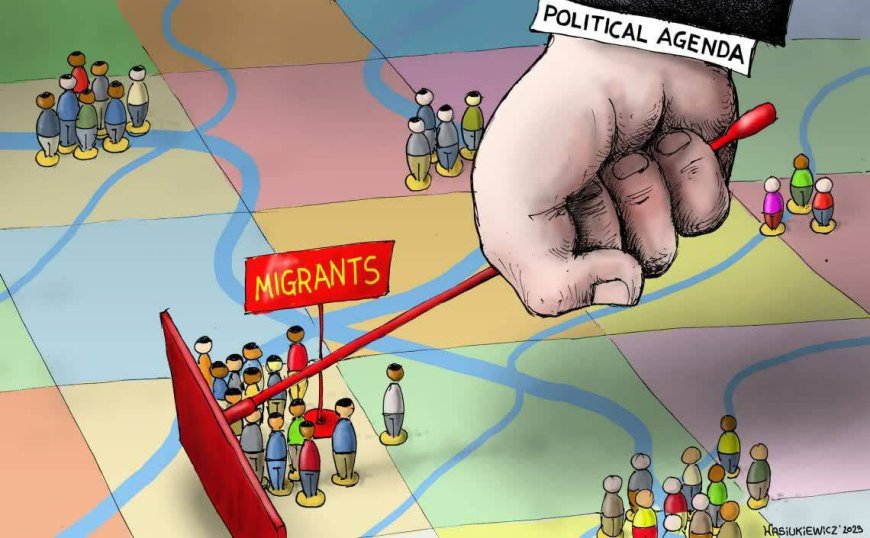Europe's Immigration Dilemma: Balancing Humanitarianism and Political Expediency
Europe, renowned for its allure and accessibility, has long been a coveted destination for immigrants from across the globe. The continent's favorable economic conditions have attracted both legal and illegal migrants, rendering it a magnet for those seeking better prospects. However, in recent years, Europe has found itself embroiled in mounting internal pressures, most notably from right-wing political groups advocating stringent border controls and stricter immigration policies. This confluence of events, triggered by the Syrian civil war and further exacerbated by the COVID-19 pandemic, has thrust Europe into a predicament that necessitates proactive measures.

Against this backdrop, the Schengen area, comprising EU member states and several other nations, finds itself grappling with the urgent need to address this issue. Crucially, these countries are acutely aware of the forthcoming European Parliament elections, which underscore the urgency of comprehensive reforms to stem the tide of right-wing populism. Ostensibly, their rationale for imposing these restrictions is rooted in combating terrorism, human trafficking, and safeguarding human rights. However, beneath the veneer of noble justifications lies Europe's underlying motive: an earnest attempt to alleviate the social and political pressures that have beset the continent, precipitating a cascade of crises.
To this end, the EU has embarked on an array of initiatives aimed at curbing immigration. Extensive cooperation agreements have been forged with non-European nations that share borders with regions experiencing a high influx of illegal migrants. By offering financial incentives to these countries, Europe seeks to bolster border control measures and mitigate the torrent of immigration. For instance, the Joint Map Program has seen the European Union allocate a staggering sum of 210 million euros to Mauritania with the aim of combating the root causes of migration, generating employment opportunities, and combating human trafficking.
Regrettably, this approach, previously employed in Tunisia, has come under scrutiny, with critics denouncing the governments involved for their ill-treatment and discrimination against immigrants. Such allegations have dealt a severe blow to Europe's credibility. While Europe ostensibly seeks to address these concerns, it appears that as long as these countries can effectively control or reduce the migration flow, Europe is willing to overlook such transgressions. Nevertheless, financial incentives may be contingent upon some semblance of remedial action being taken to rectify the discriminatory treatment of immigrants. It is, however, incumbent upon us to acknowledge that Europe's own actions and policies have been instrumental in driving migration to its shores. By prioritizing their economic and political interests over those of other nations, European countries have inadvertently sown seeds of insecurity and economic upheaval, particularly among the African coastal nations. Europe's attempt to absolve itself of culpability and evade the consequences of its actions has proven less than successful, despite its concerted efforts to manage the issue through diverse means.
In addition to these measures, Europe is contemplating a tightening and revision of the laws governing the Schengen area, with the objective of better managing the influx of large numbers of illegal immigrants. Under the proposed framework, in the event of a "severe security threat," a Schengen member state would be empowered to temporarily regain control over its borders within the Schengen zone. However, such border control measures would only be applicable for a limited period of two years, with the possibility of extension for an additional year, subject to approval by the European Parliament and Council.
This initiative, allegedly aimed at preserving the Schengen area, arises from the tensions that emerged when certain member states sought to tighten border controls with neighboring countries in response to the surge in immigration. The amendment plan, recently presented and agreed upon by the members, seeks to mitigate these disputes and reduce the scope of contention.
However, it is worth questioning the efficacy of Europe's actions in curbing immigration. Even if the deportation process were to intensify, it is unlikely to alleviate the mounting pressure on European statesmen. Europe's piecemeal solutions to immigration management appear to be more of a public relations exercise, strategically employed by the European Union to advance broader goals and expand its sphere of influence. Under the guise of combating illegal immigration, Europe makes economic investments in various countries, positioning itself as an economic partner. Naturally, alongside economic and political interests, Europe is keen to maintain its image as a champion of human rights, a reputation that has been marred by Europe's perceived inaction during the Gaza conflict, thereby eroding its standing in the court of public opinion. Consequently, Europe endeavors to define and pursue its multifaceted objectives over an extended time horizon.
In conclusion, Europe stands at a pivotal juncture, torn between its humanitarian ideals and the exigencies of political expedience. Navigating the complex landscape of immigration necessitates a delicate balancing act, one that must address the root causes of migration while upholding fundamental human rights. The path forward demands a comprehensive and compassionate approach, wherein Europe acknowledges its historical role in shaping the circumstances driving migration while seeking sustainable, equitable solutions. Only through such concerted efforts can Europe hope to reconcile its internal pressures, preserve its geopolitical influence, and emerge as a beacon of compassion in an increasingly interconnected world.













































